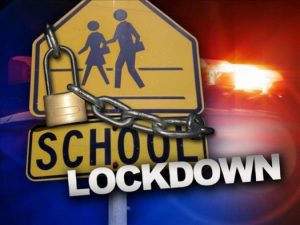I was recently at an elementary school in Philadelphia, and participated with the teachers, students, and staff in a lockdown drill that they had scheduled for that day. Beyond being impressed at the speed and organization with which the drill was completed, and the level of obvious trust that the students shared with the adults in the room, I was taken aback.
The students participating in the drill were blissfully unaware of the reason for it. If they knew about the recent school violence in the country, they didn’t seem to connect that to their time out of the classroom that day.
Although I am deeply grateful for the fact that those students don’t understand why they were asked to participate on that day, I am painfully aware of the need for such drills in our nation’s schools. If you have any type of social media as a parent, it’s impossible to browse around without seeing charming little jingles that kindergarten teachers have made up to try to teach the rules of a lock-down to their kids, new gadgets that prevent classroom doors from being opened, or letters from parents of children in schools affected by violence recounting their experiences.
It’s heart-wrenching…
As a psychologist working with children and adolescents, one of the things that I’ve noticed is that there is a need to talk about what to say to our children about all of this. What do you say to your son or daughter who asks you why they are being asked to get under their desks? How do you respond when your teen says they received a scary snapchat?
Beyond the typical anxiety that I see centered around academics, an overarching fear I see a lot of is related to interpersonal violence between students and fear for their safety. Although my immediate reaction is that our children don’t deserve to have these worries (which they don’t), I am painfully aware of the fact that they face these fears anyway. We, as parents and professionals, don’t have the luxury of brushing those fears aside, dismissing them as unlikely concerns. Our children are facing very real threats, and they’re scared.
That means that we, as parents, are faced with helping them through it. A daunting task, I know, but one of insurmountable importance.
So, let’s talk about some practical ways to help your child feel safe while they learn:
- When they ask about lockdown drills: While older children may understand the purpose of these drills, younger ones might not.
- For the youngest little ones,there is benefit in connecting these drills to stranger-danger. Much like we try to avoid talking to strangers unless introduced by a parent, we don’t want strangers coming into the school. You can then explain that those drills are the teachers’ way of keeping students safe if there is someone in the building that doesn’t belong there so that the teachers can make sure that everyone is safe. This can be effective for the ones who are too small to be aware of the violence in the news.
- For older kids, who are more aware of the violence in schools, they are usually more worried about the likelihood of a real-life situation in which the drill becomes a necessity. It’s helpful to connect lockdown drills to a fire drill. Much like the school doesn’t anticipate there will be a fire, they don’t anticipate that there will be an intruder trying to harm their students. However, just like we want to know what to do if a fire happens, we also want to know how to stay safe in the extremely unlikely event that an intruder is in the building.
- When they ask about school violence reported in the news:As much as we wish we could prevent our kids from seeing these incidents on the news, they’re going to hear about school violence.
- For the smaller kids, they tend to understand violence on a very micro level (pushing, hitting, biting, etc. between peers).They’re probably not going to understand mass-violence. What is likely to help them understand at an age-appropriate level, without scaring them unnecessarily, is to offer them a simplified explanation. Much like they would get in trouble for hitting a friend, the person they are seeing on the news got into big trouble for hurting some of their friends really badly. Because they did that, they got into big big trouble, which is why people are talking about it on TV. It’s then important to talk about measures that their own school takes to keep them safe (see below).
- For the older ones, or the kids who know more about what violence is being reported, they typically have fewer questions about what is going on, and are more scared (understandably so). They usually want someone to hear their concerns (and their opinions, whether you agree with them or not), and they need you to validate how they feel. Make sure that they know that you are there and invite an open dialogue. And again, and most importantly for these kids, talk about what measures are taken to keep them safe.
- When they’re worried about their own safety: Regardless of how old your children are, it’s important for you to be aware of what safety measures are in place to ensure that they don’t need to be concerned.This will vary by school, naturally. However, most schools have been reaching out to parents to let them know what they are doing to keep their children safe. Just like you need that comfort, your children should know about those measures too. One of the best things that you can do is to let your kids know that you’ve looked into how their safety is ensured, and that you feel confident that their school is taking appropriate steps to make sure that they are safe. The youngerkids might not need much further explanation, while the olderones might want more detail.
It’s normal to be worried about your children as they go out into the world, regardless of the fact that their world might be as small as an elementary school or as large as an entire college campus (and beyond). Try and remember that our kids (especially the smaller ones) take their cues from us. Take some time to soothe your own fears, and encourage your children to do the same (or do it together!). Their fears of encountering violence in their schools may be real, but their realities have the potential to change the world. And right now, we guide the direction they go in.
…and give your kiddos an extra big hug tonight…. just because…
